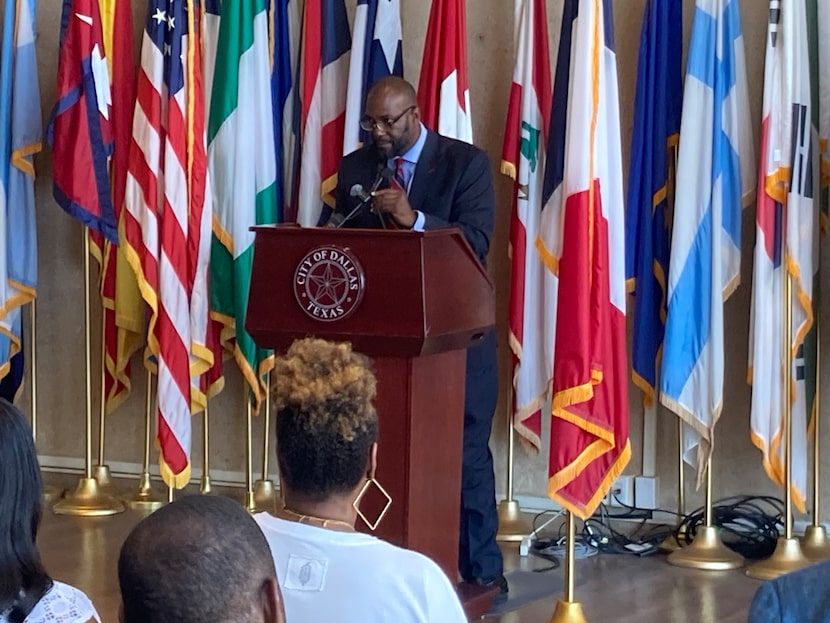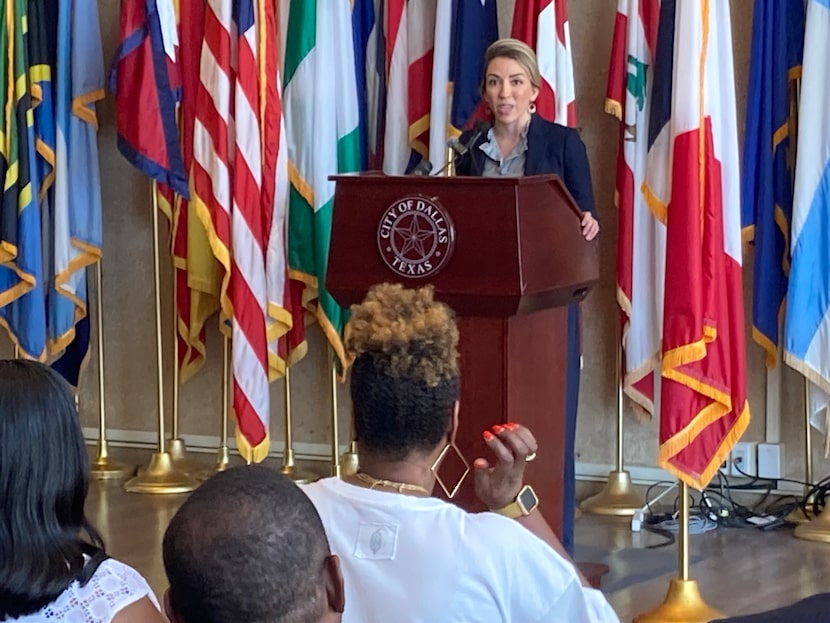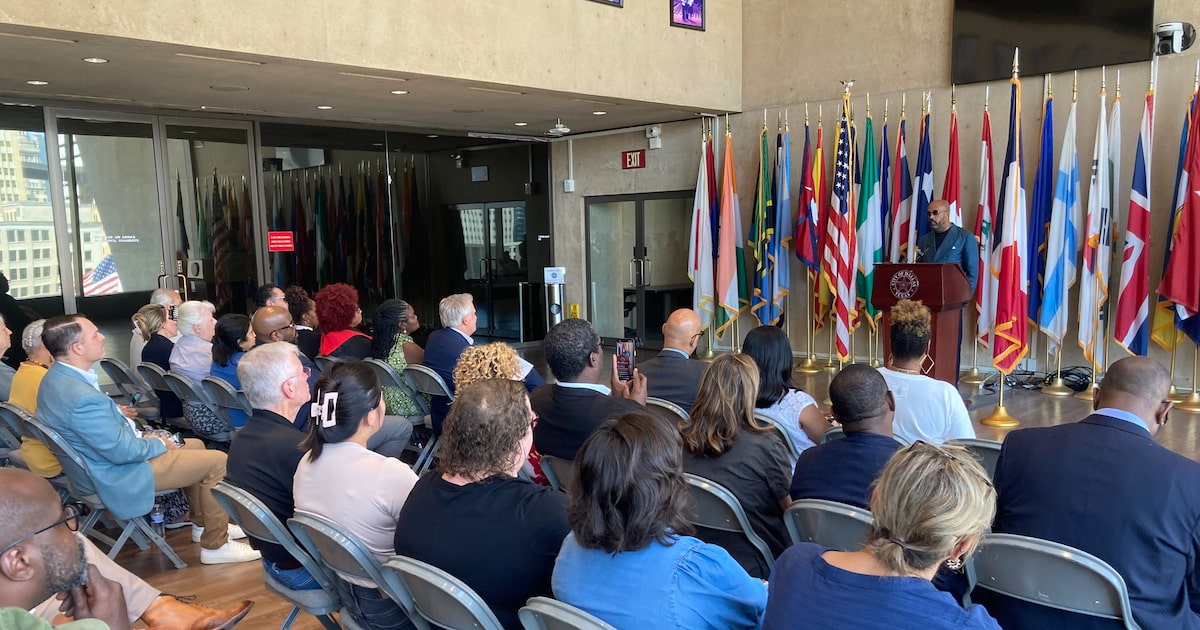A group of Dallas community leaders is urging city officials to reaffirm their commitment to improving racial equity for residents despite announced plans to stop all city policies and programs promoting diversity, equity and inclusion.
About half a dozen pastors and former City Council members at Dallas City Hall on Monday called on city officials to show “moral courage” in light of anti-DEI directives recently announced by President Donald Trump that put federal funding at risk. They urged the city to continue advancing racial equity through all available legal means and ensuring city policies and budget decisions consistently reflect a commitment to equity.
“We expect them to find every possible means — to rename programs as necessary — to fund the priorities that we have been talking about, that we have agreed upon,” said the Rev. George Mason, president of Dallas-based nonprofit interfaith group Faith Commons on Monday. “Look, if you have a Venn diagram of poverty and race in this city, the overlap is undeniable.”
Related:AI, job cuts, more money for cops: 7 things to know about Dallas’ proposed $5.2B budget
Political Points
The group also said it was important to continue monitoring the results of these programs to make sure city policies aren’t worsening inequalities among residents.
Mason and other leaders said their intent Monday wasn’t to “point fingers or assign blame.” They acknowledged the city could be risking federal money that goes to aid underserved populations by defying anti-DEI mandates. However, they wanted city officials to come up with ways to still honor their commitment to racial equity in a form that residents can feel and are measurable.
The news conference comes after City Manager Kimberly Bizor Tolbert announced last week she ordered all city departments in late June to stop using policies and programs that consider race, gender, ethnicity, religion or national origin in decisions regarding the allocation of funds or benefits. The Dallas City Council also that month authorized Tolbert to review and evaluate city programs with the federal directives and pause any initiatives that didn’t comply.
Dallas officials hope this decision will help the city keep millions in federal grant money. Over the past three years, Dallas has received an average of $305 million annually. These funds support various programs, including housing and economic development projects, transportation, justice assistance, and nutrition programs for women, infants and children.
The city immediately stopped its racial equity plan, a strategy approved by the City Council in 2022 to address racial and ethnic disparities impacting Dallas residents, and a business inclusion and development policy aimed at helping businesses owned by women and people of color land city contracts. The city’s office of equity and inclusion will no longer be a standalone department and will be combined with three others into a new office of housing and community empowerment.
All city DEI programs are under legal review. Some could be revamped. For example, a program could focus on aid to small, Dallas-based businesses rather than enterprises owned by women and people of color.
Tolbert told The Dallas Morning News on Friday, while discussing her proposed upcoming $5.2 billion city budget, that she believes equity “can’t be about an office” and has to be inherently embedded into the work the city’s municipal government does.
“We have an opportunity to do the work in a way that we are still addressing disparities,” Tolbert said Friday. “We’re looking at barriers, and we’re continuing to find ways to create pathways for people to thrive across our city, no matter where they live, no matter what ZIP code they’re in, we know that that work and that body of work has to continue.”

Former Dallas City Council member Casey Thomas speaks to a crowd at Dallas City Hall on Monday, Aug. 11, 2025. He was among around half a dozen Dallas community leaders calling on city officials to reaffirm their commitment to racial equity despite announcing plans to pause all programs and policies promoting diversity, equity and inclusion amid new federal mandates.
Everton Bailey Jr./The Dallas Mo
Former City Council member Casey Thomas on Monday expressed disappointment in the Dallas City Council’s decision to pause the racial equity plan, which he helped spearhead while an elected official. He noted the upcoming budget appears to be the first one in four years that won’t clearly state the city’s commitment to racial equity.
“Our city budget is a reflection of our values, and we who stand united here today value equity and don’t want to see the city lose ground on the progress that has been made,” he said.
Rev. Victoria Robb Powers, senior pastor of Royal Lane Baptist Church, condemned the federal mandate as “political extortion” by the Trump administration. She described racial equity work in Dallas as being about justice and reparation, not discrimination.

Rev. Victoria Robb Powers, senior pastor at Royal Lane Baptist Church, speaks to a crowd at Dallas City Hall on Monday, Aug. 11, 2025. She was among around half a dozen Dallas community leaders calling on city officials to reaffirm their commitment to racial equity despite announcing plans to pause all programs and policies promoting diversity, equity and inclusion amid new federal mandates.
Everton Bailey Jr./The Dallas Mo
“Dallas must show the nation that our values are not for sale, our vision is not for rent, and our commitment to justice cannot be bought off or bullied away,” she said. “Our communities have waited too long, too long for these commitments to be made real, and so we cannot give up on them now.”
Council members Paula Blackmon, Laura Cadena, Zarin Gracey and Maxie Johnson were among the crowd who attended the event Monday. Cadena, who was elected in May, told The News after the event that she appreciated “the leaders speaking out and offering their support to collaborate with us on our common goals of racial equity, which hasn’t changed.”
Gracey said he was expecting “city staff to have a thoughtful response to the requests made here today.”
“And I’m planning to work with my colleagues and the city manager to make sure that happens,” he said.
Council member Paula Blackmon said she supports Tolbert’s efforts to work with the community while trying to maintain compliance with federal executive orders. Blackmon said there’s no doubt Dallas’ history and data shows historical injustices faced by people of color in Dallas, including intentional segregation caused by city policies and that she felt it was still important to making the city accessible and prosperous for everyone.
“How we label it? It’s just a label,” Blackmon said. “But I hope that we will be judged on our actions moving forward.”
